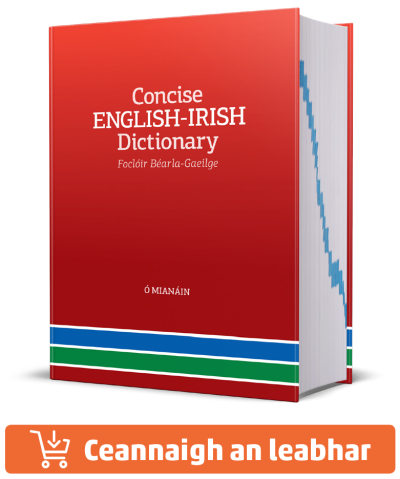Foclóir Gaeilge–Béarla
Ó Dónaill, 1977
An Foclóir Beag
Ó Dónaill & Ua Maoileoin, 1991
English–Irish Dictionary
de Bhaldraithe, 1959
Gramadach
Foghraíocht
rútáil
ruth
ruthag
ruthagach
ruthaill
s
sa
-sa
sá
sabaitéir
sabaitéireacht
sabh
sábh
sábhach
sábhadóir
sábhadóireacht
sabhaí
sábháil
sábháilte
sábháilteacht
sabhaircín
sábhairne
sábhála
-sa3, emphatic suff. 1. (Used after poss. adjectives mo, do, a fsg., bhur, with nouns or adjectives ending in broad consonant or broad vowel) Seo mo pheannsa, this is my pen. Cá bhfuil do leabharsa? Where is your book? Tá bhur n-aithreachasa beo, your fathers are alive. Pósadh a carasa, her friend got married. M’iníon ógsa, my young daughter. 2. (With 1 sg. & 2 sg. synthetic verb forms ending in broad consonant or broad vowel) Beadsa ann leis, I’ll be there also. Fansa anseo go maidin, you stay here till morning. Dhéanfása praiseach de, you would make a mess of it. 3. (With 1 sg. & 2 sg. prep. prons. ending in broad consonant) An liomsa nó leatsa é? Is it mine or yours? Tabhair domsa iad, give them to me. Bíodh an ceann eile agatsa, you may have the other one.
sa1 : i2.
sa2, part. (In lit. phrases) Mó sa mhó, more and more. Measa sa mheasa, worse and worse. Mó sa chách, most of all.
CUARDACH DROIM AR AIS
IN FOCLÓIR GAEILGE—BÉARLA
ABAIRTÍ
IN FOCLÓIR GAEILGE—BÉARLA
Dúirt mé liom féin gurbh fhearr dom fanacht sa bhaile, I said in my own mind, I considered, that it would be better for me to stay at home.
9. ~ beag, ~ sa bheag, almost.
Tá an buidéal lán ~ sa bheag, the bottle is practically full.
Cá mhéad ~ sa Phaidir? How many petitions are there in the Lord’s Prayer?
Níl aon ~ sa lá, the day is very short.
D’~ mé é fanacht sa bhaile, I pleaded with him, begged him, to stay at home.
Bíonn ~ daoine ar an áit seo sa samhradh, people frequent this place in summer.
Chuir sé ~ sa scéal, he added to, qualified, the statement.
1. Tá sé sa chéill is aigeantaí aici, he is crazy about her.
Bíonn cuma ~ ar an tír sa gheimhreadh, the country looks dreary in the winter.
~ an uisce sa loch, sa bhairille, the level of the water in the lake, in the barrel.
D’~ mé sa láthair é, I sensed his presence.
~ liom sa ród, take the road along with me.
A ~ sa rang, his place, order, in class.
A ~ sa saol, his station in life.
An chéad ~ sa scrúdú, first place in the examination.
Chonaic mé an ~ sa dorchadas, I saw a figure in the dark.
Tá ~ sa bhóthar, there is a rise in the road.
~ sa lá, sa bhliain, late in the day, in the year.
~ is isteach sa teach, in and out of the house.
Rud a ligean ~, sa dul ~, to let sth. go to waste.
Chuaigh sé ~ sa dorchadas, he got lost in the dark.
~ sa pháirc, ar an loch, out in the field, on the lake.
de (> den), do (> don), i (> sa, san before
de, do, i (> sa); d, t eclipsed under same circumstances as
Níl maith sa seanchas nuair a bhíos an ~ déanta, it is no use crying over spilt milk.
~ a chur sa chuideachta, sa cheol, to liven up the company, the music.
~ san ól, sa tobac, craving for drink, tobacco.
Shuigh sé ~ sa leaba, he sat up in bed.
Ag teacht ~ sa saol, rising up in the world, prospering.
Tá sé ag dul ~ sa lá, sa saol, it is getting late in the day, in life.
Ag teacht ~ sa saol, coming down in the world.
Níl mórán ~a sa ghasúr sin, that boy doesn’t look very strong.
Go h~ sa spéir, high in the sky.
4. Go h~ sa tráthnóna, in mid-afternoon.
Chuaigh an bhó in ~ sa chriathrach, the cow got stuck in the bog.
~ sa bhalla, a peg in the wall.
~ a chur sa talamh, to put a peg, a short stake, in the ground.
Sa bhaile, ag ~, at home.
~eadh (dá chosa) sa doimhneacht é, he was taken off his feet in the deep water.
Chuir mé cluiche agus bhí mé dhá phingin sa bháin, I got a game and was owed twopence from the kitty.
D’éirigh sé ~ sa ghnúis, his face blanched.
Sa, leis an, lá ~, in broad daylight.
Airgead a chur sa bhanc, to lodge money in the bank.
An lasóg a chur sa bharrach, to inflame passions; to start a row.
Ná cuir do bhata sa ghleo, don’t interfere in the fight, argument.
Ach ~; ach sa bheag, almost.
Cuir ~ sa tua dom, put an edge on the axe for me.
D’éirigh sé sa bhéal orm, he abused me to my face.
Tá na páistí ag éirí sa bhéal orm, the children are clamouring at me.
ABAIRTÍ
IN FOCLÓIR GAEILGE—BÉARLA
Rinne tú go ~ orm é, you acted treacherously towards me; you let me down badly. S.a.
